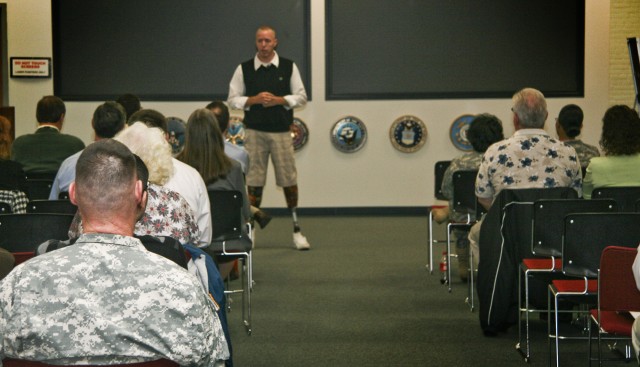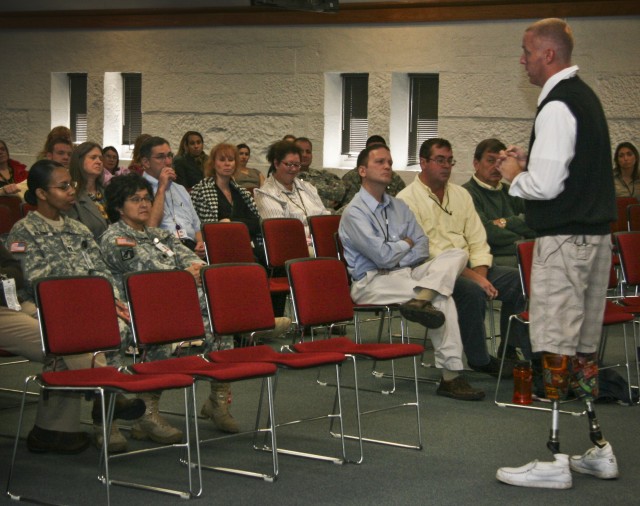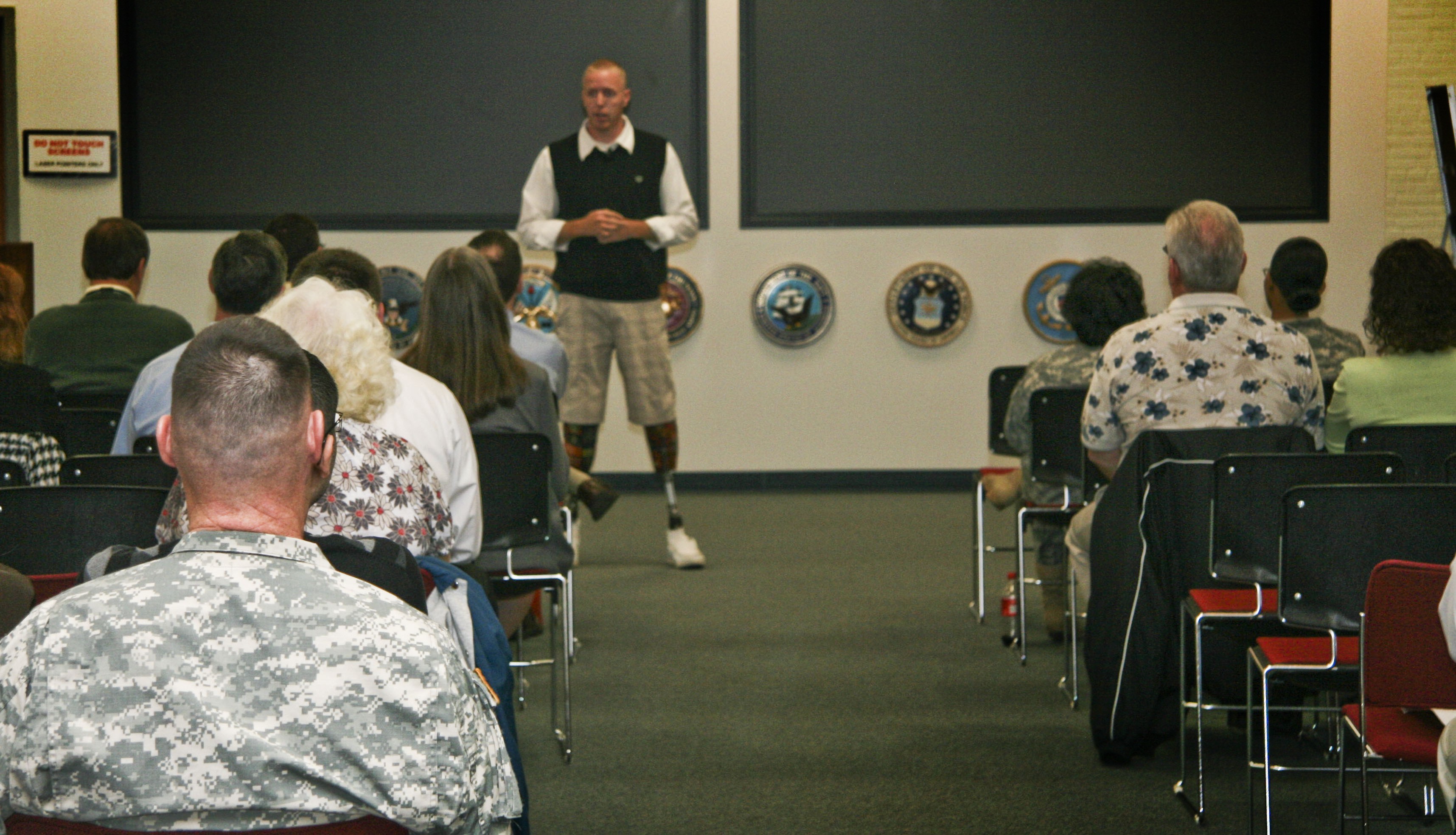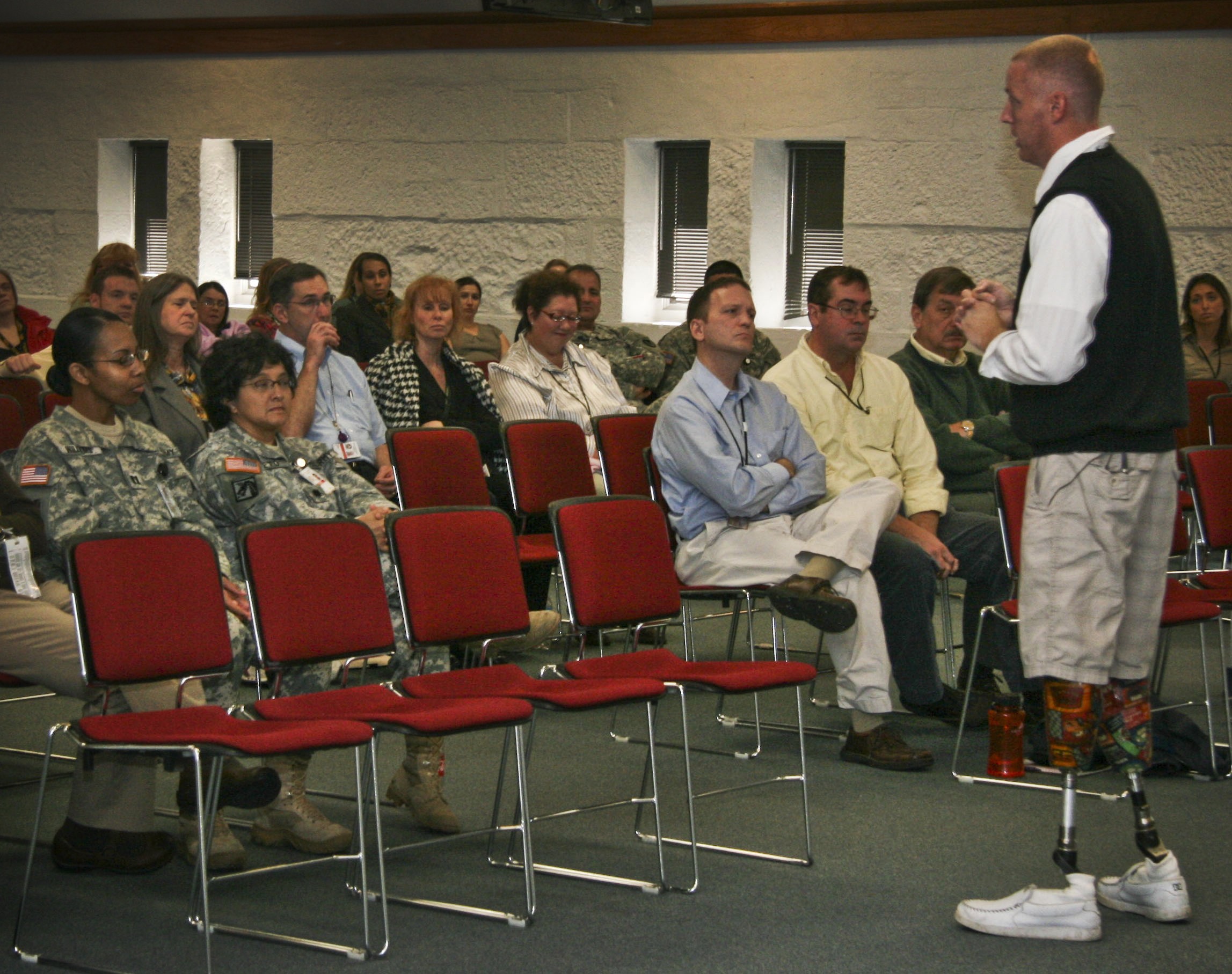ROCK ISLAND, Ill.-When former Cpl. Robert "B.J." Jackson walks into a room and starts talking about what people need most from their leaders, the audience tends to listen.
Even more so when they realize he walked in on two prosthetic legs and the marks on his hands and forearms are burn scars.
As he stood in front of the dozens of Department of the Army civilians and Soldiers of the Army Sustainment Command in Rock Island Arsenal's Black Hawk Conference Room on Nov. 9, those in attendance instantly recognized him for what he was and what he represented.
On Aug. 7, 2003, Jackson was on patrol as a Military Police officer in Baghdad with four other Soldiers of the Iowa National Guard. The patrol came under attack as the Humvee he was driving rolled over a land mine. The mine detonated under Jackson's seat.
As Soldiers of the patrol fought against the insurgent attack, Jackson's group worked for several hours to free him from the burning truck.
"My legs were so burnt [that] when they pulled me out, my legs did not come with me," he said. "All I can remember is grabbing my legs and saying, 'God, get me home.'"
He was airlifted to a field hospital for immediate care, then to Kuwait, and on to Landstuhl Regional Medical Center in Germany for additional treatment. Five days after he was wounded, he arrived at Brooke Army Medical Center in San Antonio, where he began his long-term recovery and rehabilitation.
He lost both legs below the knee and suffered burns on his head, hands, arms, and lower back. During the 50 days of care he received in the post-burn unit, Jackson was given more than 25 units of blood.
That November, Jackson was relearning to walk on his new prosthetic legs, and by December, he was downhill skiing in Breckenridge, Colo.
Recalling the first days of the ill-fated Iraq deployment, Jackson said, "We were 18 to 24-year-old kids relying on our leadership; our more experienced sergeants. We learned early on that [it was] a completely different lifestyle we had to take on. This [was] something greater than ourselves."
Originally slated to stay behind in Iowa as the rest of his Guard unit deployed, Jackson balked at the idea.
"How do you take that after training with the unit for three years'" he asked. "[It's] kind of a slap in the face to a young Specialist."
Jackson volunteered for the opportunity to serve alongside the men and women he trained so hard with.
"I said, 'You know what, First Sergeant, leave someone home that don't want to go,'" Jackson said. "'I want to go with you.'"
Jackson spoke of the responsibilities inherent in any leadership position, whether it is leading troops into battle, or leading a team of clerks in an office every day. He said the key is inspiring others to the realization that it isn't about them, that "there's something greater happening here."
"You learn that it's not within you," he said. "It's the leadership that leads you every day, pushing you harder and harder to make you want to serve for them."
After the events of Aug. 7, 2003, Jackson said he experienced a moment of clarity one day at the medical center during one the many blood transfusions.
"How do things get better from here'" he asked himself that day. "I couldn't tell you until six weeks later when I awoke to actually feel it."
For those six weeks, Jackson lay in a drug-induced, dream-filled coma. Dreams, he explained, where his wife's car was hit by a rocket-propelled grenade, or she was hit by a train. He woke from his coma with his wife by his side.
"In those six weeks I lost 70 pounds and about seven inches. It's not a very good weight loss program; I do not suggest it," he quipped. "When I was able to sit up for the first time, I looked down, and they were sliding a [prosthetic] foot on my cast."
That was the moment when the reality of his wounds sunk in.
"After gaining about 20 pounds I was able to get up and do therapy and learn how to walk with those feet," he said.
Throughout his recovery, he said, all he could think "was what am I going to do'"
"My wife was 20 years old when I got hurt," said Jackson about his recovery, more than seven years prior. "Is she going to stick around' She shouldn't have to go through an experience like this."
Jackson told the audience motivation from his family - particularly his daughters - to push more, to go further, and never give up, inspired him to realize there was, "still something greater than himself."
"I didn't understand what it was," he said. "I could've just gave up."
Being a Specialist in the Army, Jackson had never had leadership training of any kind and didn't know much about leadership.
"On the day I got hurt, I saw a Specialist [and] a PV2 in my vehicle as true leaders - true heroes," he said. "The Sergeant and the Specialist in the vehicle behind [mine], made me realize this truly is greater than us."
Through all his therapy and his "crazy antics," he observed the people around him exhibited a variety of leadership traits.
"My first sergeant put his military career on the line by getting evac'ed to Brooke Army Medical Center with me," said Jackson. "Because he said when we left he would bring [us] all home. He [figured he] was delivering my body to my wife.
"How do you get a bigger leader than that'" he asked.
The staff at BAMC had come to count on Jackson as a goodwill ambassador for all of his volunteer work visiting other wounded servicemembers. He soon was invited to a meeting with like-minded people who wanted to spread a message of hope to those who have been injured.
Jackson ended his Rock Island session with advice for young leaders.
"The more that we push ourselves, the more that others behind us will follow," Jackson said. "Take it slow, learn from those around you and you will be a better leader. The ones that you don't expect to step up, do.
"Make sure you communicate, listen, understand, and truly lead, not just make orders."
Motivation, he said, is the biggest factor in leadership.
"If your employees, your staff, your sergeants, your Soldiers, don't have faith in you, they are not going to follow you," he said.
A native of Des Moines, Iowa, Jackson lives with his wife, Abigail, two daughters, Brilynn and Haley, and four sons, Carter, Nolan, Parker, and Drake.




Social Sharing